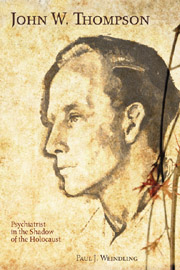Book contents
- Frontmatter
- Contents
- List of Illustrations
- Acknowledgments
- List of Abbreviations
- Part One Into the Dark
- 1 “Ecce Homo”
- 2 Mexican Childhood
- 3 Palo Alto Schooling, Stanford Student
- 4 Transatlantic Physiologist
- 5 Edinburgh Physician
- 6 Excitable Harvard
- 7 High Altitude and Rapid Descent
- 8 Auden, Anxiety, and the German Mind
- Part Two Redemption
- Part Three Aftermath
- Appendix John Thompson's Writings
- Notes
- Sources
- Index
4 - Transatlantic Physiologist
from Part One - Into the Dark
Published online by Cambridge University Press: 12 September 2012
- Frontmatter
- Contents
- List of Illustrations
- Acknowledgments
- List of Abbreviations
- Part One Into the Dark
- 1 “Ecce Homo”
- 2 Mexican Childhood
- 3 Palo Alto Schooling, Stanford Student
- 4 Transatlantic Physiologist
- 5 Edinburgh Physician
- 6 Excitable Harvard
- 7 High Altitude and Rapid Descent
- 8 Auden, Anxiety, and the German Mind
- Part Two Redemption
- Part Three Aftermath
- Appendix John Thompson's Writings
- Notes
- Sources
- Index
Summary
To the World's Best Medical School
In Sinclair Lewis's Pulitzer Prize–winning novel Arrowsmith, the tyro physician vacillates among laboratory research, medical practice in the Wild West, public health and eugenics, and a lucrative private practice. John Thompson, AB, found himself dealing with similar moral dilemmas: Should he help the sick and distressed, teach and research in neurophysiology, or specialize in psychiatry and open the way to a new understanding of mental distress? The novel's climax dealt presciently with the ethics of clinical research on an experimental and statistical basis. Thompson's mother read Arrowsmith to Frank and Margaret, wondering which medical path her son would choose.
Thompson set his sights on laboratory medicine and decided to seek out and “rub up” against the great pioneers in physiology. The new horizons of European neurophysiology drew him. It was a golden age of the study of the nervous impulses and of the synaptic fibers between the nerves. If he could understand the transmission of nervous energy, he thought he could solve the problems of mental instability, sexual neuroses, and social conflict.
Thompson returned from Stanford to Mexico and announced that he was disappointed in the United States. He asked for his father's support for medical studies at Edinburgh. He sailed from Vera Cruz and enrolled at the historic University of Edinburgh in October 1928, at age twenty-two. The university had a progressive medical school.
- Type
- Chapter
- Information
- John W. ThompsonPsychiatrist in the Shadow of the Holocaust, pp. 24 - 29Publisher: Boydell & BrewerPrint publication year: 2010



